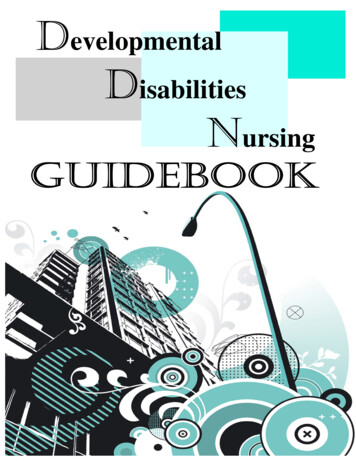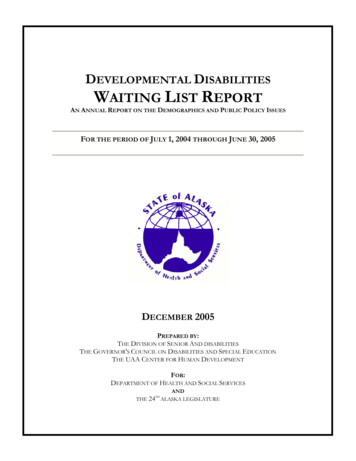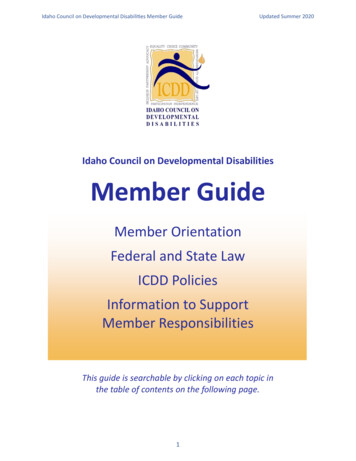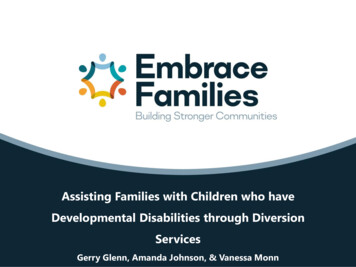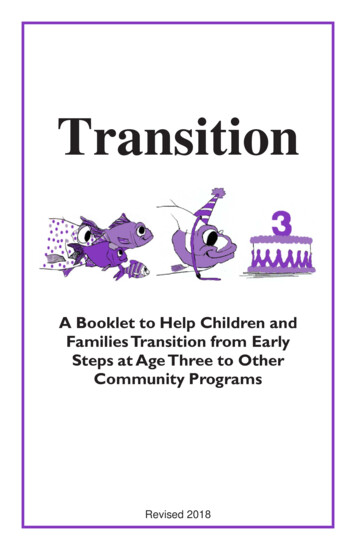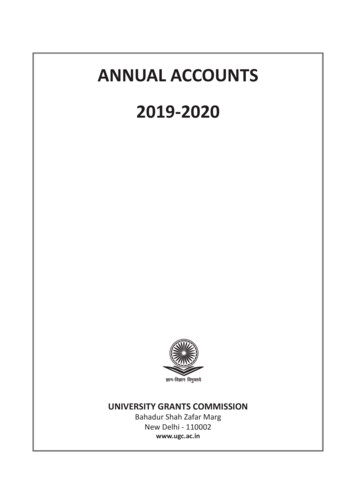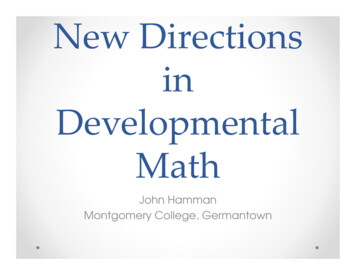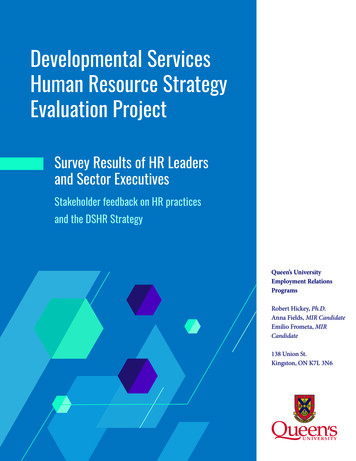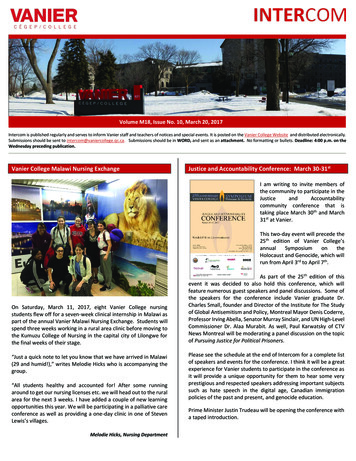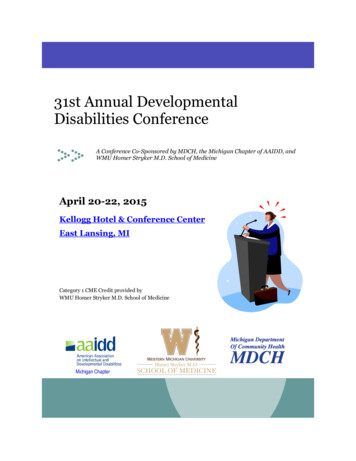
Transcription
31st Annual DevelopmentalDisabilities ConferenceA Conference Co-Sponsored by MDCH, the Michigan Chapter of AAIDD, andWMU Homer Stryker M.D. School of MedicineApril 20-22, 2015Kellogg Hotel & Conference CenterEast Lansing, MICategory 1 CME Credit provided byWMU Homer Stryker M.D. School of MedicineMichigan Chapter
Page 231st Annual Developmental Disabilities ConferenceTable of ContentsOverview . 3Objectives . 3Planning Committee . 4Presenters . 5Sponsors. 7Workshops by Practice Level . 8Workshops by Track . 10Conference Schedule. 14Conference Information . 30Registration Form . 33
31st Annual Developmental Disabilities ConferencePage 3Overview & ObjectivesOverviewThe Annual Developmental Disabilities Conference will focus on issues related to healthcare, social, community, and educational services which are of critical importance to the future of persons with developmental disabilities. The program will provide an overview of issues related tothe spectrum of services currently available as well as strategies for enhancing these services.The program format is designed to present a variety of expert viewpoints to encourage interaction with health professionals. The combination of didactic and workshop format will allow ample opportunity for participants to engage in discussion with the presenters.This educational program is designed for physicians, nurses, psychologists, social workers, therapists, nutritionists, educators, home care providers, and other professionals interested in the delivery of care and services to persons with developmental disabilitiesObjectivesFrom attending this conference, professionals in developmental disability care will be able to: Identify effective methods for the practical application of concepts related toimproving the delivery of services for persons with developmental disabilities. Identify advances in clinical assessment and management of selected healthcare issues related to persons with developmental disabilities. Discuss the ethical issues related to persons with developmental disabilities. Identify and emphasize attitudes that enhance the opportunities for personswith developmental disabilities to achieve their optimal potential. Develop strategies to promote community inclusion in meeting the needs ofpersons with developmental disabilities.
Page 431st Annual Developmental Disabilities ConferencePlanning CommitteeBETHANY BANNERWMU Homer Stryker M.D.School of MedicineJUDITH BRADY, PhDMichigan State UniversityCollege of Human MedicineBETH CHILDRESS, OTRKANDU IncorporatedDIANE CIRICAHS Community Services, Inc.ANNETTE DOWNEY, LMSWCommunity Living ServicesOakland County DivisionSUE GABRIEL, PMHNP-BCIonia County CMHCommunity Resource AllianceDAVID LAMAN, PhDDevelopmental EnhancementDIANE L. MCCALL, MS, RNWayne CenterSTEFANIE NASSAR, PA-CLansing Pediatric AssociatesDILIP R. PATEL, MD, MBAConference Co-ChairWMU Homer Stryker M.D.School of MedicineChildren’s Special Healthcare ServicesCOURTNEY PUFFERWMU Homer Stryker M.D.School of MedicinePRICE PULLINS, MAConference Co-ChairMichigan Department of Community HealthTONY C. KIM, MDCommunity Living ServicesCHARLYSS RAY, OTR-LMichigan Department of Community Health
31st Annual Developmental Disabilities ConferencePresentersALIREZA AMIRSADIWayne State School of MedicineCYNTHIA ARFKENSHELLY BANIACARE of Southeastern MichiganJENNIFER BOHNEMacomb-Oakland Regional Center, Inc.Page 5Ionia County CMHCALVIN GAGEGreat Lakes Center for AutismTreatment and ResearchLISA GROSTMichigan Department of Community HealthMELISSA HOFFMANNMary Free Bed Rehabilitation HospitalLUCINDA BROWNCommunity Living Services—Oakland CountyJAMESENA INGRAMAutism Compass Consulting, LLCSAMANTHA CARINOUniversity of Michigan Hospital DentistryEVA JENSONDisability Advocates of Kent CountyANN CARRELLASDevelopmental Disabilities InstituteANNETTE JESKEPATRICIA CARVERCommunity Drive, Inc.LAUREN CAVALLIGreat Lakes Center for AutismTreatment and ResearchASHLEY COULTER, DMDUniversity of Michigan Hospital DentistryCOLLEEN DODICH, MDWMU Homer Stryker M.D.School of MedicineTISA JOHNSONHenry Ford PediatricsKYM JUNTTIThe Michigan Center For Positive Living SupportsDAVID KARWACKIUniversity of Michigan Hospital DentistryHOLLY KAUPA, MAGrand Rapids Community CollegeJEANA KOERBERGreat Lakes Center for AutismTreatment and ResearchSHERRIE DONNELLYERIC J. DYKSTRADevelopmental Enhancement, PLCJOE’L FARRARADAM FUHRMANMacomb-Oakland Regional Center, Inc.SUE GABRIELCATHERINE KOTHARI, PhDWMU Homer Stryker M.D. School of MedicineKATHLEEN KOVACHOakland County CommunityMental Health AuthorityTRACY L. KROEGERAACT/CRA
Page 6Presenters31st Annual Developmental Disabilities ConferenceDAVID LAMAN, PhDDevelopmental Enhancement, PLCCONNY RAAYMAKERSDevelopmental Enhancement, PLCKATHY LENTZKalamazoo Community MentalHealth and Substance Abuse ServicesSUSAN REFIORCHERYL LEVINEMichigan Special Education Mediation ProgramSUSAN LUNDYANDREA MANCHIPClinton-Eaton-Ingham CMHANGELA MARTINWayne State UniversityTOM MCCULLOUGHSTEPHANIE MUNZUniversity of Michigan Health SystemPAUL MILLERMichigan Disability Rights CoalitionPHILIP NOWICKI, MDHelen DeVos Children's HospitalAMY ORTEGOMary Free Bed Rehabilitation HospitalERIN PARCELLClinton-Eaton-Ingham CMHRENEE PETERSRICHARD R. ROACHWMU Homer Stryker M.D. School of MedicineSHUYAN ROFEUniversity of Michigan Hospital DentistrySGT SCOTT SCHUELKEAutism Alliance of MichiganRAY SCHUHOLZCommunity Living ServicesDYLAN SECORDMARY P. SHARP, MDPrinciple Autism Medical Consulting PLCMICHELLE SHERENClinton-Eaton-Ingham CMHJUSTIN SHOUNIAAUDREY SMITHDetroit Wayne Mental Health AuthorityPHIL SMITHEastern Michigan UniversityTHERESA SQUIRESMichigan Disability Rights CoalitionDAVID TAYLORCARLY PIACENTINIGreat Lakes Center for AutismTreatment and ResearchNAOMI TWIGGUIC CONJOSEPH PIETRONJOHN TOPPIALBERT PIZZUTIJANE L. TURNERMichigan State UniversityCHARLYSS RAYState of MichiganDEBRA WARREN
31st Annual Developmental Disabilities ConferencePage 7SponsorsDevelopmental Enhancement, PLC - Bronze SponsorGreat Lakes Center for Autism Treatment and ResearchMichigan Disability Sports AllianceMichigan Family to Family Health Information CenterPrader-Willi Syndrome of MI
31st Annual Developmental Disabilities ConferencePage 8Workshops by Practice LevelBeginnerBeginnerA2A2 TheThe EpidemicEpidemic ofof LonelinessLoneliness andand itsits EffectsEffects onon HealthHealth andand HealingHealingA4A4 DisabilitiesDisabilities inin thethe WorkplaceWorkplaceA5A5 UsingUsing communitycommunity datadata toto informinform aa coordinatedcoordinated responseresponse forfor adultsadults withwith al disabilidisabilitiestiesA7A7 AbsoluteAbsolute Accessibility:Accessibility: ExtendingExtending accessibilityaccessibility toto languagelanguage andand curriculumcurriculumA8A8 LifeLife OutcomesOutcomes forfor PeoplePeople withwith DevelopmentalDevelopmental Disabilities:Disabilities: TheThe FailureFailure ofof SpecialSpecial EducationEducationB1B1 MedicalMedical TransitionTransition forfor YouthYouth withwith SpecialSpecial HealthHealth CareCare NeedsNeedsB3B2 BuildingAutism SafetyBetterTrainingLives in Essentialthe Community:For EveryWhatCommunityis it reallyAgencylike out there for adults with I/DD?B4B3 Community: What is it really like out there for adults with I/DD?B7B4 WorkingA PersonalwithAssistantDeaf, Deaf-blind,as an Ally and Hard of Hearing individuals with developmental disabilitiesB8B7 HistoryWorkingofwiththe Deaf,DisabilityDeaf-blind,Rights Movement:and Hard ofLearnHearingfromindividualsthe past, sowithyoudevelopmentalcan help reinventdisabilitiesthe futureC1B8 IntroductionHistory of ment: Learn from the past, so you can help reinvent the futureC2C1 PresentationsIntroduction toonAugmentativeOral Health andCommunicationDentistryC4C2 CrucialPresentationsConversationson OralinHealthSpecialandEducationDentistryC5C4 Family-centeredCrucial Conversationscare coordinationin Special Educationfor children and youth with special health care needsC8C5 PresentationsFamily-centeredon careLeadershipcoordinationSkills andfor childrenSocial Skillsand youth with special health care needsD3C8 FollowPresentationsthe Yellowon LeadershipBrick Road:SkillsHowandto getSocialto OzSkillsD4D3 WhatFollowaboutthe Yellow"Her" BrickPower?:Road:IncludingHow toGirls'get toDevelopmentOzResearch in Transition ProgramsD6D4 ng(Part 1) Girls' Development Research in Transition ProgramsE3D6 ChildrenIn the Trenchesand AdolescentsWith FASD!with(PartASD:1) New findings in effective treatment for highly challenging casesE5E3 FoodChildrenfor Thoughtand AdolescentsProgram:withLearningASD: Newfoodfindingsskills to inhelpeffectiveyour futuretreatmentgrow for highly challenging casesE6E5 ng(Part 2) food skills to help your future growF1E6 DeinstitutionalizationIn the Trenches With FASD!of Adults(Partwith2) Developmental Disabilities: A report on critical incidentsF4The Philosophical andofPracticalStepsDevelopmentalNeeded to CreateCommunity-BasedOptionsEveryone: Why theF1 DeinstitutionalizationAdults withDisabilities:A report oncriticalforincidentsoldhave fallencan’t getup Needed to Create Community-Based Options for Everyone: Why theF4 paradigmsThe PhilosophicalandandPracticalStepsold paradigms have fallen and can’t get upIntermediate
Page 931st Annual Developmental Disabilities ConferenceWorkshops by Practice LevelA1 What else might be going on?A3IntermediateDiagnostic Evolution According to the DSM-VA6A1 ConsiderationsWhat else mightforbeImplementinggoing on?the Supports Intensity Scale B5A3 OnDiagnosticMy Own:EvolutionTransitioningAccordingto independenceto the DSM-VB6A6 ConsiderationsIncluding AdultforSiblingsImplementingin the Personthe SupportsCenteredIntensityPlanningScale ProcessC3B5C5B6C7C3D1C5D5C7E1D1E8D5F3UpdateOn My Own:ImplementingTransitioningthe MIto independenceHealth Link Program (dual eligible demonstration project)Let’sTalkAboutSex::Runninga groupCenteredfor peoplewith DD/IDto explore relationships and sexualityIncluding Adult Siblings in the rkplaceUpdate- Implementing the MI Health Link Program (dual eligible demonstration project)Sexual and Reproductive Health for Adolescents with DisabilitiesLet’s Talk About Sex:: Running a group for people with DD/ID to explore relationships and sexualityAccessible Community Design: A Holistic ApproachAutism Spectrum Disorder in the WorkplaceOrthopaedic Management of Cerebral Palsy Patients for the Non-OrthopaedistSexualBrainand ReproductiveHealthforbuilding/Adolescentswith DisabilitiesFromto Behavior: StaffskillCompassionateCare taker (Part 1)AccessibleCommunityDesign:HolisticApproachGroup Therapy:HarnessingtheApowerof groupdynamics to promote changeF6WhatAn Later:IndividualWith Children'sAn FASD NeedsIn Orderto SucceedD7 OneYearChangingLives usingABA-anupdateF8Brain toManagementBehavior: Staffskill building/CompassionateCare taker (Part 2)E1 FromOrthopaedicof CerebralPalsy Patientsfor the Non-OrthopaedistE8 From Brain to Behavior: Staff skill building/ Compassionate Care taker (Part 1)F3 Group Therapy: Harnessing the power of group dynamics to promote changeF6 What An Individual With An FASD Needs In Order to SucceedF8 From Brain to Behavior: Staff skill building/ Compassionate Care taker (Part 2)
31st Annual Developmental Disabilities ConferenceWorkshops by TrackPediatric MedicalA1 What else might be going on?B1 Medical Transition for Youth with Special Health Care NeedsC1 Introduction to Augmentative CommunicationC5 Family-centered care coordination for children and youth with special health care needsD1 Sexual and Reproductive Health for Adolescents with DisabilitiesE1Orthopaedic Management of Cerebral Palsy Patients for the Non-OrthopaedistAdult MedicalA1 What else might be going on?A2 The Epidemic of Loneliness and its Effects on Health and HealingA6 Considerations for Implementing the Supports Intensity Scale C1 Introduction to Augmentative CommunicationC2 Presentations on Oral Health and DentistryF6 What An Individual With An FASD Needs In Order to SucceedMental HealthA1 What else might be going on?A2 The Epidemic of Loneliness and its Effects on Health and HealingA3 Diagnostic Evolution According to the DSM-VB2 Autism Safety Training Essential For Every Community AgencyB3 Building Better Lives in the Community: What is it really like out there for adults with I/DD?B6 Including Adult Siblings in the Person Centered Planning ProcessB8 History of the Disability Rights Movement: Learn from the past, so you can help reinvent the futureC3 Update- Implementing the MI Health Link Program (dual eligible demonstration project)C5 Family-centered care coordination for children and youth with special health care needsC8 Presentations on Leadership Skills and Social SkillsD3 Follow the Yellow Brick Road: How to get to OzD7 One Year Later: Changing Children's Lives using ABA-an updateE3 Children and Adolescents with ASD: New findings in effective treatment for highly challenging casesE8 From Brain to Behavior: Staff skill building/ Compassionate Care taker (Part 1)F3 Group Therapy: Harnessing the power of group dynamics to promote changeF6 What An Individual With An FASD Needs In Order to SucceedF8 From Brain to Behavior: Staff skill building/ Compassionate Care taker (Part 2)Page 10
Page 1131st Annual Developmental Disabilities ConferenceWorkshops by TrackIssues in TransitionA4 Disabilities in the WorkplaceA8 Life Outcomes for People with Developmental Disabilities: The Failure of Special EducationB1 Medical Transition for Youth with Special Health Care NeedsB4 A Personal Assistant as an AllyB5 On My Own: Transitioning to independenceB8 History of the Disability Rights Movement: Learn from the past, so you can help reinvent the futureC8 Presentations on Leadership Skills and Social SkillsD4 What about "Her" Power?: Including Girls' Development Research in Transition ProgramsD6 In the Trenches With FASD! (Part 1)E5 Food for Thought Program: Learning food skills to help your future growE6 In the Trenches With FASD! (Part 2)F1 Deinstitutionalization of Adults with Developmental Disabilities: A report on critical incidentsF4 The Philosophical and Practical Steps Needed to Create Community-Based Options for Everyone: Why theold paradigms have fallen and can’t get upF6 What An Individual With An FASD Needs In Order to SucceedEducationA7 Absolute Accessibility: Extending accessibility to language and curriculumB8 History of the Disability Rights Movement: Learn from the past, so you can help reinvent the futureC1 Introduction to Augmentative CommunicationC4 Crucial Conversations in Special EducationC8 Presentations on Leadership Skills and Social SkillsD4 What about "Her" Power?: Including Girls' Development Research in Transition ProgramsD5 Accessible Community Design: A Holistic ApproachD6 In the Trenches With FASD! (Part 1)E3 Children and Adolescents with ASD: New findings in effective treatment for highly challenging casesE5 Food for Thought Program: Learning food skills to help your future growE6 In the Trenches With FASD! (Part 2)E8 From Brain to Behavior: Staff skill building/ Compassionate Care taker (Part 1)F6 What An Individual With An FASD Needs In Order to SucceedF8 From Brain to Behavior: Staff skill building/ Compassionate Care taker (Part 2)
31st Annual Developmental Disabilities ConferencePage 12Workshops by TrackTrendsA3 Diagnostic Evolution According to the DSM-VA5 Using community data to inform a coordinated response for adults with intellectual/developmental disabilitiesB3 Building Better Lives in the Community: What is it really like out there for adults with I/DD?B4 A Personal Assistant as an AllyB5 On My Own: Transitioning to independenceB8 History of the Disability Rights Movement: Learn from the past, so you can help reinvent the futureC1 Introduction to Augmentative CommunicationC3 Update- Implementing the MI Health Link Program (dual eligible demonstration project)C5 Let’s Talk About Sex:: Running a group for people with DD/ID to explore relationships and sexualityC8 Presentations on Leadership Skills and Social SkillsD4 What about "Her" Power?: Including Girls' Development Research in Transition ProgramsD5 Accessible Community Design: A Holistic ApproachE5 Food for Thought Program: Learning food skills to help your future growF1 Deinstitutionalization of Adults with Developmental Disabilities: A report on critical incidentsF4 The Philosophical and Practical Steps Needed to Create Community-Based Options for Everyone: Why theold paradigms have fallen and can’t get upF6 What An Individual With An FASD Needs In Order to SucceedPsychiatryA1 What else might be going on?E8 From Brain to Behavior: Staff skill building/ Compassionate Care taker (Part 1)F6 What An Individual With An FASD Needs In Order to SucceedF8 From Brain to Behavior: Staff skill building/ Compassionate Care taker (Part 2)
Page 1331st Annual Developmental Disabilities ConferenceWorkshops by TrackOn the Front LineA1 What else might be going on?A5 Using community data to inform a coordinated response for adults with intellectual/developmental disabilitiesA6 Considerations for Implementing the Supports Intensity Scale B2 Autism Safety Training Essential For Every Community AgencyB3 Building Better Lives in the Community: What is it really like out there for adults with I/DD?B4 A Personal Assistant as an AllyB6 Including Adult Siblings in the Person Centered Planning ProcessB8 History of the Disability Rights Movement: Learn from the past, so you can help reinvent the futureC1 Introduction to Augmentative CommunicationC3 Update- Implementing the MI Health Link Program (dual eligible demonstration project)D4 What about "Her" Power?: Including Girls' Development Research in Transition ProgramsD5 Accessible Community Design: A Holistic ApproachD6 In the Trenches With FASD! (Part 1)E6 In the Trenches With FASD! (Part 2)E8 From Brain to Behavior: Staff skill building/ Compassionate Care taker (Part 1)F1 Deinstitutionalization of Adults with Developmental Disabilities: A report on critical incidentsF4 The Philosophical and Practical Steps Needed to Create Community-Based Options for Everyone: Why theold paradigms have fallen and can’t get upF6 What An Individual With An FASD Needs In Order to SucceedF8 From Brain to Behavior: Staff skill building/ Compassionate Care taker (Part 2)Living Longer, Living BetterA2 The Epidemic of Loneliness and its Effects on Health and HealingA4 Disabilities in the WorkplaceA6 Considerations for Implementing the Supports Intensity Scale A7 Absolute Accessibility: Extending accessibility to language and curriculumB7 Working with Deaf, Deaf-blind, and Hard of Hearing individuals with developmental disabilitiesB8 History of the Disability Rights Movement: Learn from the past, so you can help reinvent the futureC1 Introduction to Augmentative CommunicationC2 Presentations on Oral Health and DentistryC7 Autism Spectrum Disorder in the WorkplaceD6 In the Trenches With FASD! (Part 1)E1Orthopaedic Management of Cerebral Palsy Patients for the Non-OrthopaedistE5 Food for Thought Program: Learning food skills to help your future growE6 In the Trenches With FASD! (Part 2)F1 Deinstitutionalization of Adults with Developmental Disabilities: A report on critical incidents
31st Annual Developmental Disabilities ConferencePage 14Conference ScheduleMonday, April 204:00 pm – 7:00 pm RegistrationTuesday, April 217:30 Registration & Breakfast8:15 Welcoming Comments8:30 Plenary AddressPatricia Haney, RN Memorial Lecture: Americans with Disabilities Act: Safeguard for personswith disabilitiesRichard R. Roach, MD, FACPADA will be reviewed with clinical cases that relate to the law and how the law applies to persons with disabilities.9:30 Break and Exhibits10:00 Concurrent WorkshopsA1What else might be going on?Mary P. Sharp M.D.A basic discussion of comorbidity and co-occurring disorders in individuals with ASDs.Primary Track: Pediatric MedicalSecondary Tracks: Adult Medical, Mental Health, On the Front Line, PsychiatryPractice Level: Intermediate
31st Annual Developmental Disabilities ConferencePage 15Conference ScheduleA2The Epidemic of Loneliness and its Effects on Health and HealingKym JunttiLoneliness is not a formal diagnosis or specific disability. However, it is a common condition coexisting with disabilities and can have potentially serious medical and emotional implications.Primary Track: Living Longer, Living BetterSecondary Track: Adult Medical, Mental HealthPractice Level: BeginnerA3Diagnostic Evolution According to the DSM-vTracy L. Kroeger, PhDThis workshop will identify the major changes in clinical conceptualization appearing in the DSM-V, with specialconsideration of the impact of these changes for individuals with Developmental Disabilities.Primary Track: Mental HealthSecondary Track: TrendsPractice Level: IntermediateA4Disabilities in the WorkplaceRichard R. Roach, MD, FACPReview of the ADA law and how it empowers disabled people to find employment.Primary Track: Issues in TransitionPractice Level: Beginner
31st Annual Developmental Disabilities ConferencePage 16Conference ScheduleA5Using Community Data to Inform a Coordinated Response for Adults with Intellectual/Developmental DisabilitiesCatherine Kothari PhDKathy LentzExplore how one community used medical, psychiatric and crime data to identify intervention opportunities foradults with intellectual/developmental disabilities. Brainstorm additional strategies suggested by the usage patterns.Primary Track: TrendsSecondary Tracks: On the Front LinePractice Level: BeginnerA6Considerations for Implementing the Supports Intensity Scale Jennifer Bohne, MS LLPCAdam Fuhrman, MA, LLPCMDCH has selected the SIS as a statewide standardized assessment tool for adults with ID/DD. Implementationdetails vary by jurisdiction, but this session will cover best practices, consistent elements, and strategies to successfully integrate the SIS .Primary Track: On the Front LineSecondary Track: Adult Medical, Special FocusPractice Level: IntermediateA7Absolute Accessibility: Extending accessibility to language and curriculumEva JensonHolly KaupaThis workshop will use discussion and hands-on activities to help participants develop truly accessible curriculumfor people with developmental disabilities. In addition, participants will learn to craft language in a truly accessible fashion.Primary Track:Living Longer, Living BetterSecondary Track: EducationPractice Level: Beginner
31st Annual Developmental Disabilities ConferencePage 17Conference ScheduleA8tionLife Outcomes for People with Developmental Disabilities: The Failure of Special Educa-Phil SmithSpecial education has failed to change outcomes for students with developmental disabilities. They experiencehigh rates of unemployment, institutionalization, violence, poverty, social isolation, and poor health carethroughout their lives.Primary Track: Issues in TransitionPractice Level: Beginner11:30 Lunch12:30 Concurrent WorkshopsB1Medical Transition for Youth with Special Health Care NeedsTisa Johnson, MDThis workshop will define the term medical transition. The workshop attendees will appreciate the fundamentalsteps in effective medical transition of youth with special health care needs into adult medical care.Primary Track: Issues in TransitionSecondary Tracks: Pediatric MedicalPractice Level: BeginnerB2Autism Safety Training Essential For Every Community AgencySgt. Scott SchuelkeLisa GrostThis presentation will provide hands on information on how agencies servicing people with developmental disabilities can be proactive with safety interventions, most common on duty situations and the best way to safelyand effectively manage it.Primary Track: Mental HealthSecondary Tracks: On the Front LinePractice Level: Beginner
31st Annual Developmental Disabilities ConferencePage 18Conference ScheduleB3DD?Building Better Lives in the Community: What is it really like out there for adults with I/Kathleen KovachKathy LentzThe National Core Indicators (NCI) surveys and interviews give Michigan information about the daily lives ofadults with I/DD. This workshop will identify areas where individuals tell us they want something different andwill share promising practices.Primary Track: Mental HealthSecondary Track: Trends, On the Front LinePractice Level: BeginnerB4A Personal Assistant as an AllyPaul Miller,Joseph PietronPaul and his personal assistant Joe will discuss how mutual respect and being an ally has helped Paul succeed inboth inclusive employment and community opportunities. Presenters will give examples and practical applicationto help others succeed.Primary Track: Issues in TransitionSecondary Track: Trends, On the Front LinePractice Level: BeginnerB5On My Own: Transitioning to independenceAndrea Manchip, LMSWErin Parcell, LPCMichelle Sheren, BSWThe goal of On My Own has been to increase independence for the people that they serve and to allow those whocan to transition into daily life without staff support. We invite you on this journey of independence.Primary Track: Issues in TransitionSecondary Track: TrendsPractice Level: Intermediate
31st Annual Developmental Disabilities ConferencePage 19Conference ScheduleB6Including Adult Siblings in the Person Centered Planning ProcessPatricia CarverAngela MartinSession attendees will learn about the unique opportunities and concerns of adult siblings of people with disabilities. Participants will learn how adult siblings are partnering with self-advocates to plan for and support their sibling's future.Primary Track: On the Front LineSecondary Track: Mental HealthPractice Level: IntermediateB7Working with Deaf, Deaf-blind, and Hard of Hearing individuals with developmental disabilitiesSusan LundyDylan SecordWorkshop explores factors that create barriers to providing culturally and linguistically accessible services toDeaf, Deaf-blind, and Hard of Hearing individuals. Enhancing skills in these areas can improve the provision ofservices for our community.Primary Track: Living Longer, Living BetterPractice Level: BeginnerB8History of the Disability Rights Movement: Learn from the past, so you can help reinventthe futureLucinda Brown, David Taylor, Ray Schuholz, Tom McCullough, and John ToppiEvery civil rights movement has important leaders that helped make a difference in the world as we know it.Come hear about key people and events that have made a difference in the advancement of civil rights for peoplewith developmental disabilities.Primary Track: On the Front LineSecondary Tracks: Mental Health, Trends, Education, Issues in Transition, Living Longer Living BetterPractice Level: Beginner
31st Annual Developmental Disabilities ConferencePage 20Conference Schedule2:00 Refreshment Break and Exhibits2:30 Concurrent WorkshopsC1Introduction to Augmentative CommunicationMelissa Hoffmann, MAAmy OrtegoAn introduction to Augmentative Communication, including what types of communication devices are available,what occurs in an evaluation for a device and what additional information/support is needed to request fundingfor a device.Primary Track: Pediatric MedicalSecondary Track: Adult Medical, Trends, On the Front Line, Education, Living Longer Living BetterPractice Level: BeginnerC2Presentations on Oral Health and Dentistry1.) Referrals to Hospital Dentistry and Clarifying the ProcessDavid Karwacki, DDSSamantha Carino, DMDThis presentation is intended for care providers of persons with developmental disabilities who wouldlike clarification regarding referral of patients for dental care in a hospital setting, including but notlimited to, treatment under general anesthesiaPrimary Track: Living Longer, Living BetterPractice Level: Beginner2.) Oral hygiene homecare strategies for persons with developmental disabilitiesAshley Coulter, DMDStephanie Munz, DDSThis presentation is intended for care providers of persons with developmental disabilities who areinterested in gaining more knowledge and information regarding homecare strategies to improve andmaintain oral hygiene.Primary Track: Adult MedicalPractice Level: Beginner
31st Annual Developmental Disabilities ConferencePage 21Conference Schedule3.) Oral Health Status and Aspiration Pneumonia: Are They Related?Shuyan Rofe DDSAspiration pneumonia is one of the biggest health threat for geriatric population as well as many patientswith disability. What is the relationship between oral heath status and aspiration pneumonia?Primary Track: Adult MedicalPractice Level: BeginnerC3Update- Implementing the MI Health Link Program (dual eligible demonstration project)Audrey E. Smith, MPHParticipants will learn how the MI Health Link Program is being implemented in Michigan. Explain how carecoordination will be handled through the "care bridge" for I/DD Consumers. Describe opportunities for stakeholder engagement.Primary Track: Mental HealthSecondary Track: Trends, On the Front LinePractice Level: IntermediateC4Crucial Conversations in Special EducationCheryl LevineAppeals and Grievances will provide a basic overview of the Appeal and Grievance mechanisms available to individuals
31st Annual Developmental Disabilities Conference Kellogg Hotel & Conference Center East Lansing, MI April 20-22, 2015 A Conference Co-Sponsored by MDCH, the Michigan Chapter of AAIDD, and
